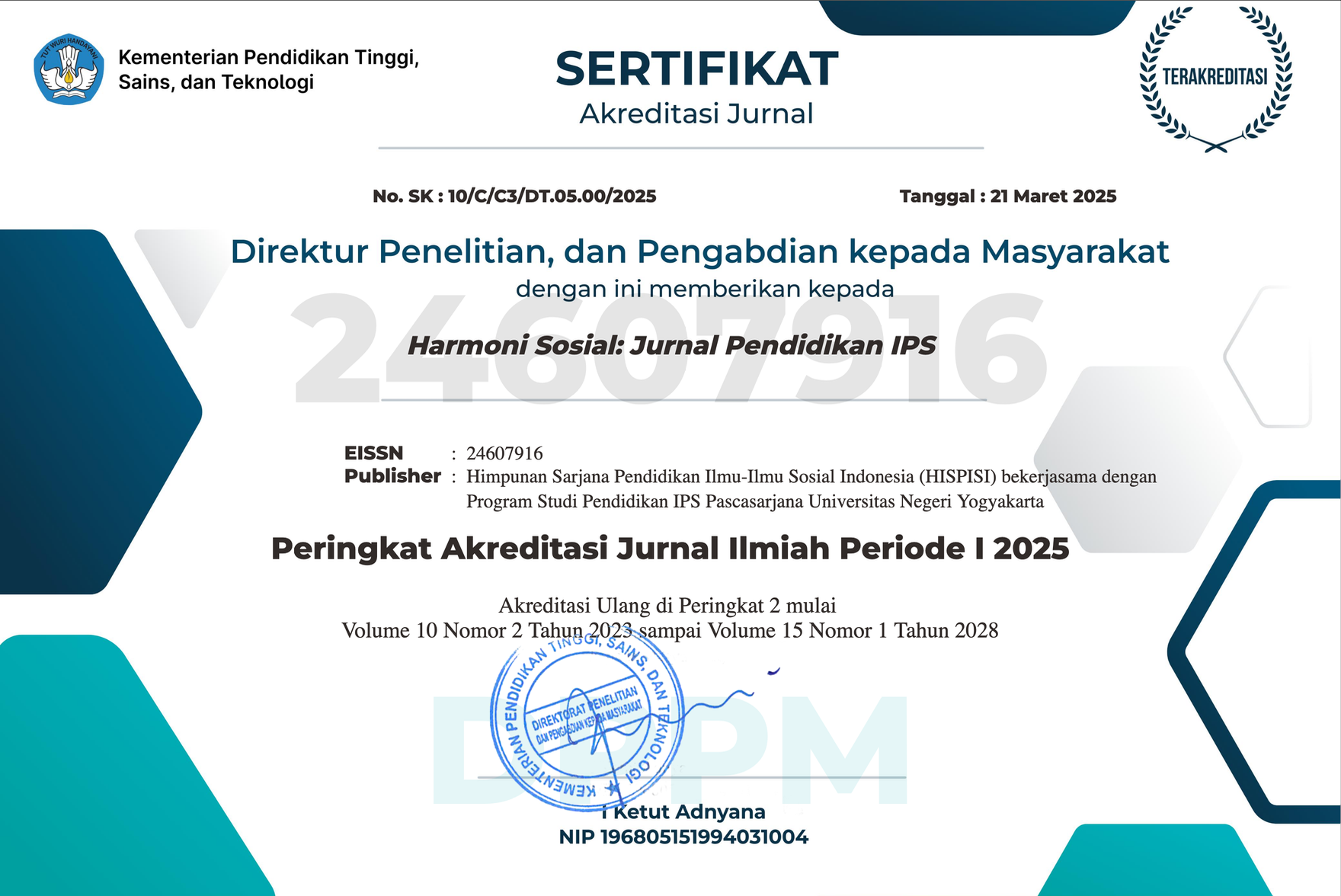Perceptions of the existence of museums for vocational students in understanding history learning objectives
Downloads
Downloads
Amiruddin, A. (2017). Peran pendidikan sejarah dalam membangun karakter bangsa. Prosiding Seminar Nasional Himpunan Sarjana Ilmu-Ilmu Sosial, 9(Januari-Desember), 193–202. https://ojs.unm.ac.id/PSN-HSIS/article/view/2744
Anggraeni, A., & Soepriyanti, H. (2023). How teachers interpret and implement Independent Curriculum: Lesson learnt from the field. Bhinneka: Jurnal Bintang Pendidikan Dan Bahasa, 1(3), 48–59. https://pbsi-upr.id/index.php/Bhinneka/article/view/176
Asmara, D. (2019). Peran Museum dalam Pembelajaran Sejarah. Kaganga:Jurnal Pendidikan Sejarah Dan Riset Sosial-Humaniora, 2(1), 10–20. https://doi.org/https://doi.org/10.31539/kaganga.v2i1.707
Boty, M., Dardiri, A., Sunarso, S., Setiawan, J., & Fadli, M. R. (2023). The values of struggle character education K.H. Ahmad Hanafiah and its implementation in local history learning. Pegem Journal of Education and Instruction, 13(2), 62–71. https://doi.org/10.47750/pegegog.13.02.08
Cabu, R., & Fika, E. C. (2021). Penyuluhan perilaku hidup bersih dan sehat meningkatkan pengetahuan siswa SMA Merah Putih di Dokulamo Kecamatan Galela Barat. JURNAL HIRONO, 1(2), 64–70. https://doi.org/10.55984/hirono.v1i2.70
Evitasari, O., Qodariah, L., Gunawan, R., Ilmu, P., Sosial, P., Uhamka, S. P., Merina, M., Fernandez, D., & Vol, J. A. (2021). Pemanfaatan Fungsi Museum Sebagai Sumber Kemampuan Berpikir Kritis. Jurnal ESTORIA, 1(1), 43–56. https://doi.org/https://doi.org/10.30998/je.v1i1.462
Febrianti, A. N., & Suryati, W. (2022). Pemanfaatan Museum Lampung sebagai sumber belajar dan tempat destinasi wisata di Lampung. Istoria: Jurnal Ilmiah Pendidikan Sejarah Universitas Batanghari, 5(2), 107–115. https://doi.org/10.33087/istoria.v5i2.132
Hanifah, U. (2019). Transformasi sosial masyarakat Samin di Bojonegoro (analisis perubahan sosial dalam pembagian kerja dan solidaritas sosial Emile Durkheim). Jurnal Sosiologi Agama, 13(1), 41–71. https://doi.org/10.14421/jsa.2019.131-02
Hasan, S. H. (2012). Pendidikan sejarah untuk memperkuat pendidikan karakter. Paramita: Historical Studies Journal, 22(1), 81–95. https://journal.unnes.ac.id/nju/index.php/paramita/article/view/1875
Herlina, E., Sundari, F. S., & Novita, L. (2023). Analysis of 21st century skills through thematic learning in elementary schools. Jurnal Pendidikan Dan Pengajaran Guru Sekolah Dasar (JPPGuseda), 6(1), 119–122. https://doi.org/10.55215/jppguseda.v6i1.7526
Imam, A., Zaidi, S. S. Z., & Qureshi, A. A. (2023). Skill set required for 21st century student: Case study of university level student. Voyage Journal of Educational Studies, 3(2), 69–91. https://doi.org/10.58622/vjes.v3i2.47
Kuntowijoyo, K. (2013). Pengantar ilmu sejarah. PT. Bentang Pustaka.
Li, A., Harries, M., & Ross, L. F. (2020). Reopening K-12 schools in the era of Coronavirus Disease 2019: Review of state-level guidance addressing equity concerns. The Journal of Pediatrics, 227, 38-44.e7. https://doi.org/10.1016/j.jpeds.2020.08.069
Miguel-Revilla, D., Sánchez-Agustí, M., & Carril-Merino, T. (2022). History education and changing epistemic beliefs about history: An intervention in initial teacher training. South African Journal of Education, 42(3), 1–11. https://doi.org/10.15700/saje.v42n3a2086
Moleong, L. J. (2014). Metodologi penelitian kualitatif. Remaja Rosdakarya.
Nurhaidah, N., & Musa, M. I. (2015). Dampak pengaruh globalisasi bagi kehidupan Bangsa Indonesia. Jurnal Pesona Dasar, 3(3), 1–9. https://jurnal.usk.ac.id/PEAR/article/view/7506
Oktaviani, E. D. (2020). Pemanfaatan Museum Keprajuritan Indonesia sebagai sumber belajar sejarah. Jurnal Pendidikan Sejarah, 9(2), 153–171. https://doi.org/10.21009/JPS.092.04
OkumuÅŸ, O. (2021). History courses and values education: History teachers' evaluation of history education processes in Turkey in terms of values education. Educational Policy Analysis and Strategic Research, 16(1), 172–193. https://doi.org/10.29329/epasr.2020.334.10
Oluwagbohunmi, M. F., & Alonge, R. A. (2023). 21st century skills and its applicability to social studies. Asian Journal of Education and Social Studies, 41(3), 37–43. https://doi.org/10.9734/ajess/2023/v41i3896
í–zí§elik, N. P., & Uka, E. E. (2023). A Bibliometric Analysis of the Studies on 21st-century Skills in ELT. Turkish Journal of Educational Studies, 10(2), 221–236. https://doi.org/10.33907/turkjes.1224491
Prasetyo, D., Manik, T. S., & Riyanti, D. (2021). Pemanfaatan museum sebagai objek wisata edukasi. Kepariwisataan: Jurnal Ilmiah, 15(1), 1–11. https://ejournal.stipram.ac.id/index.php/kepariwisataan/article/view/20/5
Putra, N. (2012). Metode penelitian kualitatif pendidikan. RajaGrafindo Persada.
Rakhim, R. A., & Witasari, N. (2021). Museum Ranggawarsita sebagai ruang publik dalam dinamika sejarah di Jawa Tengah sebagai barometer Budaya Jawa (1975-2017). Journal of Indonesia History, 10(2), 191–207. https://journal.unnes.ac.id/sju/index.php/jih/article/view/53073/21250
Sugiyono, S. (2016). Metode penelitian pendidikan. Alfabeta.
Supradono, B. (2018). Peranan program inkubator bisnis untuk menumbuhkembangkan pelaku usaha ekonomi kreatif. In A. S. Pahlevi, A. Pabulo, B. Supradono, D. Hidayat, D. Dellyana, F. R. Wijaya, H. Jusuf, M. B. Mulyadi, T. Indahyani, & W. Wibawanto (Eds.), Kolase pemikiran ekonomi kreatif (pp. 24–36). CV. Oxy Consultant. https://www.researchgate.net/profile/Desman_Hidayat/publication/330753503_Kolase_Pemikiran_Ekonomi_Kreatif_Indonesia/links/5c52c53b299bf12be3eff877/Kolase-Pemikiran-Ekonomi-Kreatif-Indonesia.pdf#page=35
Susilo, A., & Isbandiyah, I. (2019). Peran guru sejarah dalam pembentukan pendidikan karakter anak era globalisasi. Indonesian Journal of Social Science Education (IJSSE), 1(2), 171–180. https://doi.org/10.29300/ijsse.v1i2.2246
Suwardani, N. P. (2015). Pewarisan nilai-nilai kearifan lokal untuk memproteksi masyarakat Bali dari dampak negatif globalisasi. Jurnal Kajian Bali (Journal of Bali Studies), 5(2), 247–264. https://ojs.unud.ac.id/index.php/kajianbali/article/download/16775/11048
Tashadi, T., Harnoko, D., & Suhatno, S. (1986). Tingkat kesadaran sejarah siswa SMTA dan masyarakat di Kotamadya Yogyakarta. Departemen Pendidikan dan Kebudayaan Direktorat Sejarah dan Nilai Tradisional Proyek Inventarisasi dan Dokumentasi Sejarah Nasional Jakarta. https://repositori.kemdikbud.go.id/12406/1/Tingkat Kesadaran Sejarah Siswa SMTA dan Masyarakat di Kotamadya Yogyakarta.pdf
Tjahjopurnomo. (2011). Sejarah Permuseuman Di Indonesia. Direktorat Permuseuman, Direktorat Jendral Sejarah dan Purbakala, Kementerian Pariwisata dan Ekonomi Kreatif.
Wasiso, A. J. (2021). Museum multatuli sebagai sumber sejarah lokal dalam pembelajaran design thinking di era digital. CHRONOLOGIA, 2(3), 39–53. https://doi.org/10.22236/jhe.v2i3.6391
Yani, A., Yusmin, E., Nursangaji, A., & Rosmaiyadi, R. (2022). Memperkokoh pendidikan karakter di sekolah melalui pembelajaran matematika. JPMI (Jurnal Pendidikan Matematika Indonesia), 7(1), 7–12. https://doi.org/10.26737/jpmi.v7i1.3095
Yusuf, M., Ibrahim, N., & Kurniawati, K. (2018). Pemanfaatan museum sebagai sumber belajar dalam pembelajaran sejarah. Visipena Journal, 9(2), 215–235. https://doi.org/10.46244/visipena.v9i2.455
Zhou, L. (2023). How to develop 21st century skills in students: The role of LEGO education. Science Insights Education Frontiers, 15(2), 2281–2283. https://doi.org/10.15354/sief.23.co066
The Authors submitting a manuscript do so on the understanding that if accepted for publication, copyright publishing of the article shall be assigned to Harmoni Sosial: Jurnal Pendidikan IPS
 | Harmoni Sosial: Jurnal Pendidikan IPS by http://journal.uny.ac.id/index.php/hsjpi is licensed under a Creative Commons Attribution-ShareAlike 4.0 International License. |









 ISSN Print
ISSN Print









